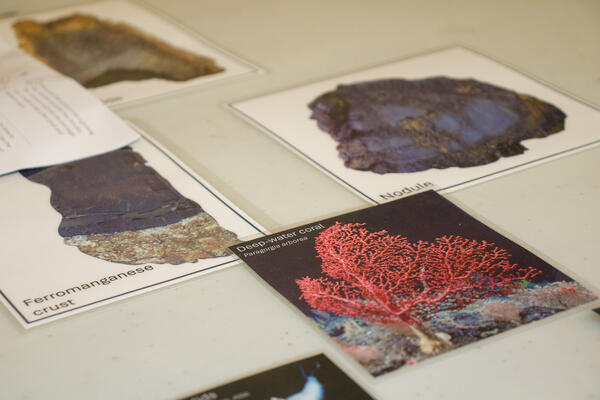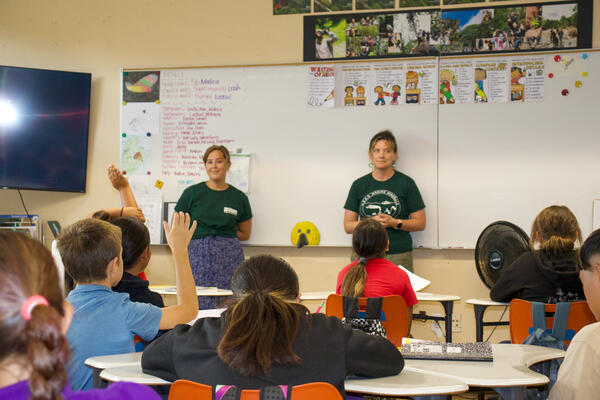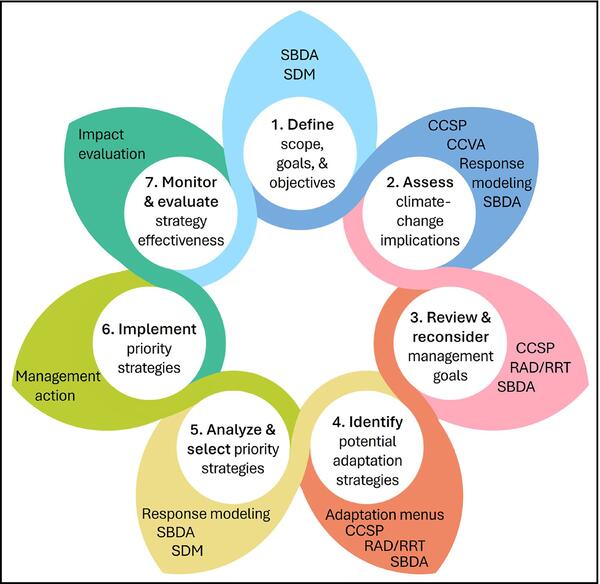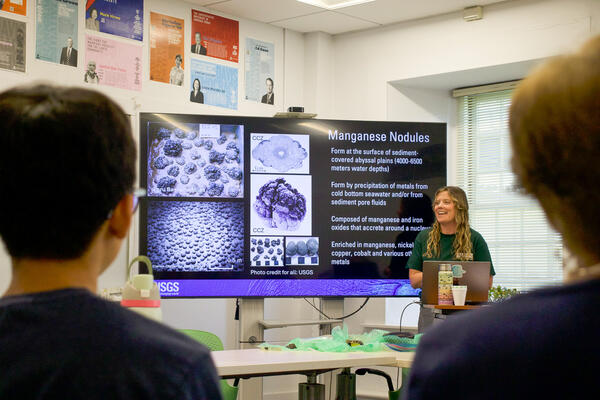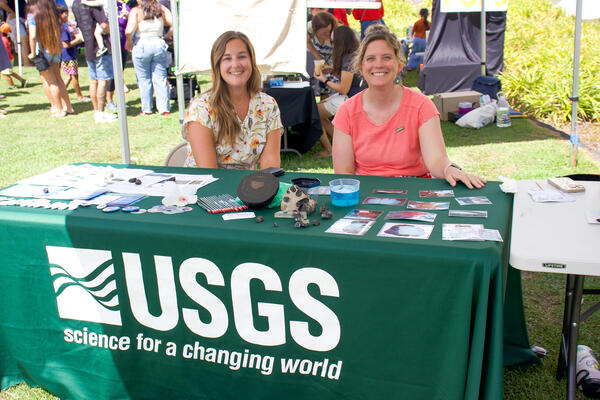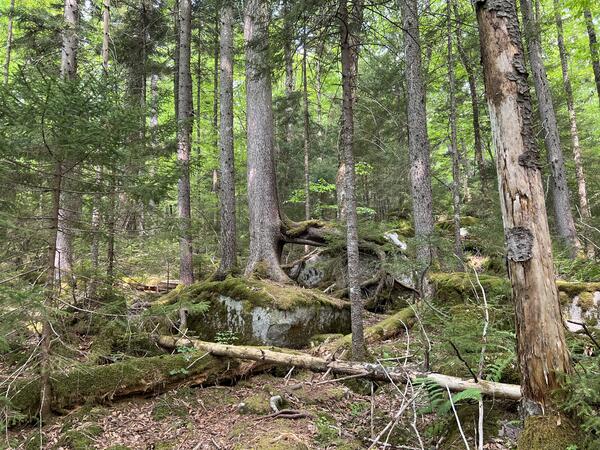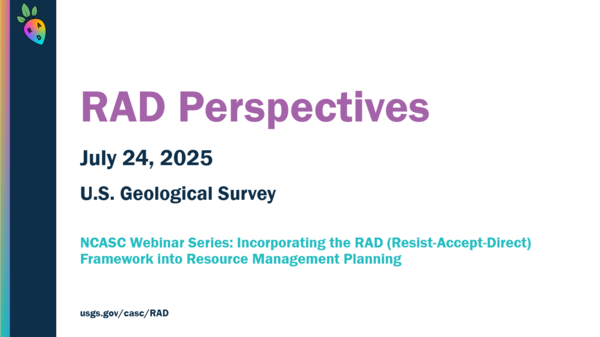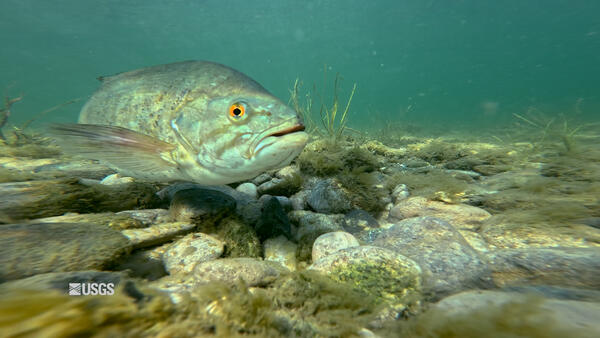Interactive game cards help fifth grade students identify the geology and biology found in the deep sea, Waimea, HI.
Multimedia
Climate Illustrations
These illustrations explore tricky climate concepts and describe how climate change impacts the world around us.
Explore Upcoming and Past Webinars
The National CASC offers monthly webinars to highlight science projects from across the CASC Network.
Featured Video
The Pacific Islands CASC, the University of Hawai'i, and the County of Hawai'i Planning Department are working together to understand the effects of sea level rise on different types of shorelines on Hawai'i Island.
Explore images, videos, and audio content developed by National and Regional CASC staff.
Images
Interactive game cards help fifth grade students identify the geology and biology found in the deep sea, Waimea, HI.
‘What do deep sea scientists study?’ USGS Scientists lead an interactive discussion with fifth grade students at Kanu o Ka ʻĀina New Century Public Charter School.
‘What do deep sea scientists study?’ USGS Scientists lead an interactive discussion with fifth grade students at Kanu o Ka ʻĀina New Century Public Charter School.
A generalized adaptation planning process depicting the stages at which various tools can be applied. For simplicity, recursive steps are not shown.
A generalized adaptation planning process depicting the stages at which various tools can be applied. For simplicity, recursive steps are not shown.
Chief Scientist Kira Mizell discusses manganese module formation with honors high school students at Punahou College Preparatory School, Oahu, HI
Chief Scientist Kira Mizell discusses manganese module formation with honors high school students at Punahou College Preparatory School, Oahu, HI
Scientists share USGS deep-sea research and manganese nodule samples at the ʻImiloa Astronomy Center’s fourth annual ʻIkuwā Festival, Hilo, HI
Scientists share USGS deep-sea research and manganese nodule samples at the ʻImiloa Astronomy Center’s fourth annual ʻIkuwā Festival, Hilo, HI
Gaudineer Knob in eastern West Virginia is home to one of the few remaining old-growth red spruce forests in the region, sitting as a unique reminder of what red spruce forests once looked like across the central and southern Appalachians.
Gaudineer Knob in eastern West Virginia is home to one of the few remaining old-growth red spruce forests in the region, sitting as a unique reminder of what red spruce forests once looked like across the central and southern Appalachians.
Videos
In this "RAD Perspectives" webinar, RAD (Resist-Accept-Direct) practitioners from the National Park Service, Great Lakes Indian Fish & Wildlife Commission (GLIFWC), Minnesota Department of Natural Resources, and the U.S.
In this "RAD Perspectives" webinar, RAD (Resist-Accept-Direct) practitioners from the National Park Service, Great Lakes Indian Fish & Wildlife Commission (GLIFWC), Minnesota Department of Natural Resources, and the U.S.
Unexpected Lessons from Invasive Adirondack Smallmouth Bass
Unexpected Lessons from Invasive Adirondack Smallmouth BassDecades of invasive smallmouth bass removal from the Adirondacks resulted in a novel discovery of rapid evolution. Despite the absence of a clear physiological adaptation pathway, intensive manual removal produced a larger population of the invasive predatory fish, growing faster and maturing earlier.
Unexpected Lessons from Invasive Adirondack Smallmouth Bass
Unexpected Lessons from Invasive Adirondack Smallmouth BassDecades of invasive smallmouth bass removal from the Adirondacks resulted in a novel discovery of rapid evolution. Despite the absence of a clear physiological adaptation pathway, intensive manual removal produced a larger population of the invasive predatory fish, growing faster and maturing earlier.
Climate refugia are places that may be buffered from and likely won’t change as much under climate change. Focusing research on these areas may offer resource managers more conservation and management options.
Climate refugia are places that may be buffered from and likely won’t change as much under climate change. Focusing research on these areas may offer resource managers more conservation and management options.
Climate Refugia: A Buffer from Climate Change (AD)
Climate Refugia: A Buffer from Climate Change (AD)Climate refugia are places that may be buffered from and likely won’t change as much under climate change. Focusing research on these areas may offer resource managers more conservation and management options.
Climate Refugia: A Buffer from Climate Change (AD)
Climate Refugia: A Buffer from Climate Change (AD)Climate refugia are places that may be buffered from and likely won’t change as much under climate change. Focusing research on these areas may offer resource managers more conservation and management options.
 A man with curly hair stands in a laboratory filled with large fish tanks and holds a jar with two small fish swimming
A man with curly hair stands in a laboratory filled with large fish tanks and holds a jar with two small fish swimming
Dropping the Bass: Stopping the spread of smallmouth bass in Grand Canyon
Dropping the Bass: Stopping the spread of smallmouth bass in Grand CanyonOn a scorching day in June 2022, the summer Lake Powell reached its lowest water level in five decades, National Park Service staff caught baby smallmouth bass in the lower Colorado River.
Dropping the Bass: Stopping the spread of smallmouth bass in Grand Canyon
Dropping the Bass: Stopping the spread of smallmouth bass in Grand CanyonOn a scorching day in June 2022, the summer Lake Powell reached its lowest water level in five decades, National Park Service staff caught baby smallmouth bass in the lower Colorado River.
 Close up of waves on a lake. Text reads: Climate Adaptation Postdoctoral Fellows Program, Coming together.
Close up of waves on a lake. Text reads: Climate Adaptation Postdoctoral Fellows Program, Coming together.
CAP Fellows Program: Coming Together as a Cohort (AD)
CAP Fellows Program: Coming Together as a Cohort (AD)Meet the 2022-2024 cohort of the Climate Adaptation Postdoctoral (CAP) Fellows Program, focused on “The Future of Aquatic Flows”!
CAP Fellows Program: Coming Together as a Cohort (AD)
CAP Fellows Program: Coming Together as a Cohort (AD)Meet the 2022-2024 cohort of the Climate Adaptation Postdoctoral (CAP) Fellows Program, focused on “The Future of Aquatic Flows”!
Audio
USGS Outstanding in the Field, Episode 11, Designing Accessible Research for Rural Communities
USGS Outstanding in the Field, Episode 11, Designing Accessible Research for Rural CommunitiesThis is a special edition of Outstanding in the Field, the U.S. Geological Survey’s podcast series produced by the Ecosystems Mission Area. In this episode we highlight stories from the Alaska Voices podcast, a partnership between the U.S. Geological Survey’s Alaska Climate Adaptation Science Center and the University of Alaska Fairbanks.
USGS Outstanding in the Field, Episode 11, Designing Accessible Research for Rural Communities
USGS Outstanding in the Field, Episode 11, Designing Accessible Research for Rural CommunitiesThis is a special edition of Outstanding in the Field, the U.S. Geological Survey’s podcast series produced by the Ecosystems Mission Area. In this episode we highlight stories from the Alaska Voices podcast, a partnership between the U.S. Geological Survey’s Alaska Climate Adaptation Science Center and the University of Alaska Fairbanks.
USGS Outstanding in the Field, Episode 8, Braving thin ice
USGS Outstanding in the Field, Episode 8, Braving thin iceThis is the first in a special edition of Outstanding in the Field, the U.S. Geological Survey’s podcast series produced by the Ecosystems Mission Area. In this series we will be highlighting stories from the Alaska Voices podcast, a partnership between the U.S. Geological Survey’s Alaska Climate Adaptation Science Center and the University of Alaska Fairbanks.
USGS Outstanding in the Field, Episode 8, Braving thin ice
USGS Outstanding in the Field, Episode 8, Braving thin iceThis is the first in a special edition of Outstanding in the Field, the U.S. Geological Survey’s podcast series produced by the Ecosystems Mission Area. In this series we will be highlighting stories from the Alaska Voices podcast, a partnership between the U.S. Geological Survey’s Alaska Climate Adaptation Science Center and the University of Alaska Fairbanks.


